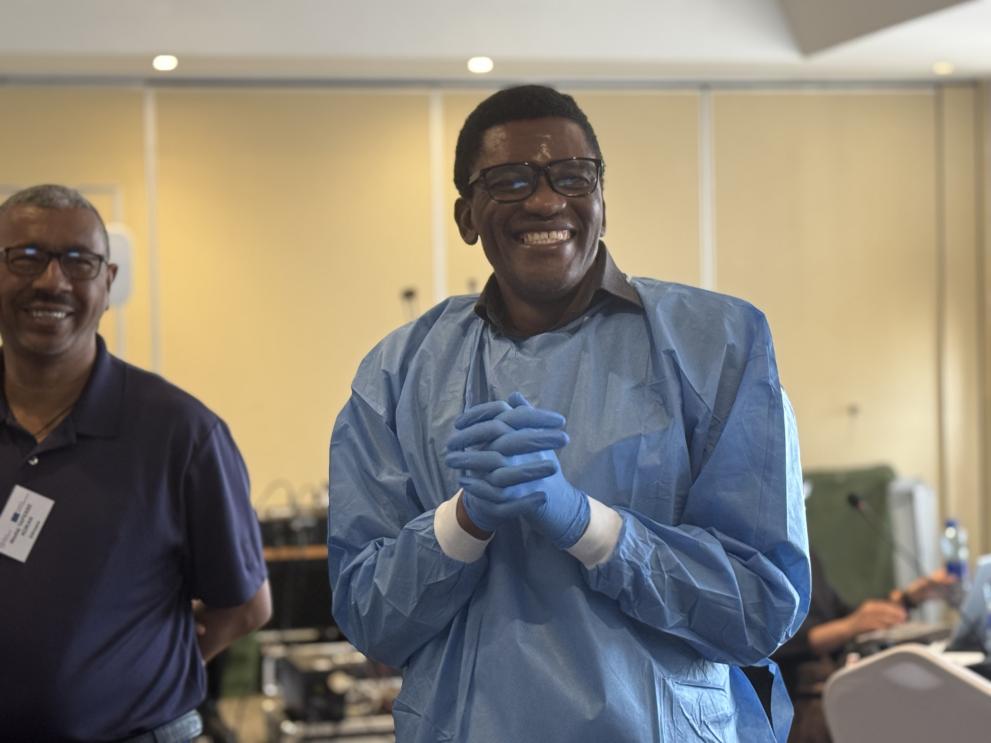
From 15-17 July 2025, 22 biosafety officers, laboratory managers, and regulators from across East and Central Africa came together for a Regional Workshop on ISO 35001:2019, the international standard for biorisk management systems.
Organised under BIOCAP-ECA (Project 99) of the EU CBRN Centres of Excellence Initiative, this intensive, hands-on workshop aimed to build practical capacity in applying ISO 35001 across diverse national contexts. The training focused on critical topics like risk assessment, Personal Protective Equipment (PPE) procedures, equipment maintenance and calibration, decontamination, laboratory design, and biorepository systems.
Access the full image gallery here.
“This is the first ISO standard that addresses biosafety and biosecurity risks in labs at the management system level,” said Joris Sprokholt, BIOCAP-ECA Key Expert. “It is based on risk assessment, involves both management and employees, and is performance-based, meaning you don’t just implement risk control measures and assume that they work. You test how well they perform in practice and improve accordingly.”
From theory to practice: risk-based, performance-focused
Over three days, participants engaged in interactive exercises and simulations grounded in real-life lab scenarios. The focus: translating abstract ISO requirements into daily operational practice.
“We began with group risk assessments. Then we ran those activities, had participants perform them, and used checklists and detection chemicals to assess decontamination performance. It was all about moving from assumptions to evidence-based safety.”
Joris Sprokholt, BIOCAP-ECA Key Expert.
For Jolly Naturinda, a senior laboratory technologist and biosafety officer from Uganda’s Mbarara Regional Referral Hospital, the experience was eye-opening.
“I'm already implementing ISO 35001 in my daily job, but I face challenges,” she explained. “This training has been one of the best I’ve ever attended. Hands-on spill management, PPE donning and doffing, these are things I can now confidently train others on.”
She reflected on the importance of involving all levels of staff. “Biosafety officers, senior management, and regulators: we were all in the room and it was very important because each one of us plays a unique role in turning policy into practice.”
Building a community of practice
A core strategy of the workshop was collaborative implementation. With over 200 criteria in ISO 35001, implentation of this standard can be a daunting task.
“Our idea is to create a laboratory community whereby labs are encouraged to divide the work and share templates across the network,” Sprokholt noted. “One lab develops a biosafety policy, another a calibration procedure, then they exchange. It’s much more efficient and builds ownership amongst the region.”
With participants hailing from ten countries, each brought distinct experiences but common challenges. “We realise we face many of the same obstacles,” said Dwayne Didon from the Seychelles Public Health Laboratory. “Sometimes a minor detail in one country’s lab can solve a problem in another.”
Beyond the Lab: Biosafety for All
Though rooted in laboratory settings, the workshop underscored that biorisk management has far-reaching implications, from public health to environmental safety.
“It’s not just for labs,” said Didon, who leads his institution’s molecular diagnostics unit and serves as biosafety officer. “In Seychelles, we’re looking at how biosafety principles can apply to hotels, waste facilities, even tourism. Simple practices, if implemented broadly, can prevent outbreaks and ensure safer communities.”
Both Didon and Naturinda expressed hope for continued engagement under the CoE programme. “This project [and support] should continue for years,” said Naturinda. “ISO 35001 is vast, we’ve only scratched the surface. More sessions would help us go deeper and improve implementation.”
The workshop concluded on 18 July with a regional coordination meeting, which laid the groundwork for future collaboration through monthly virtual exchanges and a Train-the-Trainer session scheduled for November 2025.
As biosafety challenges grow more complex, the success of the Dar es Salaam workshop demonstrated that shared standards, mutual learning, and hands-on training remain the strongest tools for regional resilience.
“Biosafety begins with me,” Naturinda said, “but it goes to everyone: my colleagues, my patients, my community. This training will help me make that difference.”
Details
- Publication date
- 24 September 2025 (Last updated on: 24 September 2025)
- Author
- Service for Foreign Policy Instruments
- CBRN areas
- Bio-safety/bio-security
- Legal framework
- CBRN categories
- Biological
- CoE Region
- ECA - Eastern and Central Africa
